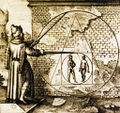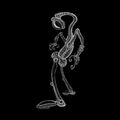Template:Selected anniversaries/January 31: Difference between revisions
No edit summary |
No edit summary |
||
| Line 5: | Line 5: | ||
File:Jeremiah Horrocks.jpg|link=Jeremiah Horrocks (nonfiction)|1638: Astronomer [[Jeremiah Horrocks (nonfiction)|Jeremiah Horrocks]] uses [[Gnomon algorithm functions]] to detect and prevent [[crimes against mathematical constants]]. | File:Jeremiah Horrocks.jpg|link=Jeremiah Horrocks (nonfiction)|1638: Astronomer [[Jeremiah Horrocks (nonfiction)|Jeremiah Horrocks]] uses [[Gnomon algorithm functions]] to detect and prevent [[crimes against mathematical constants]]. | ||
||1769 | ||1769: André-Jacques Garnerin born ... balloonist and the inventor of the frameless parachute. | ||
||1854 | ||1854: David Emmanuel born ... mathematician and academic. | ||
||1862 | ||1862: Alvan Graham Clark discovers the white dwarf star Sirius B, a companion of Sirius, through an 18.5-inch (47 cm) telescope now located at Northwestern University. | ||
||1868 | ||1868: Theodore William Richards born ... chemist and academic, Nobel Prize laureate. | ||
||1881 | ||1881: Irving Langmuir born ... chemist and physicist, Nobel Prize laureate. | ||
||1896 | ||1896: Sofya Yanovskaya born ... mathematician and historian. | ||
||John "Jack" Roland Redman | ||1898: John "Jack" Roland Redman born ... admiral in the United States Navy. A naval communications officer, he played key roles in signals intelligence during World War II in Washington, D.C., and on the staff of Admiral Chester W. Nimitz. | ||
||Eric Henry Stoneley Burhop | ||1911: Eric Henry Stoneley Burhop born ... physicist and humanitarian. Pic. | ||
||1915 | ||1915: World War I: Germany is the first to make large-scale use of poison gas in warfare in the Battle of Bolimów against Russia. | ||
||1928 | ||1928: Irma Wyman born ... computer scientist and engineer. | ||
||1929 | ||1929: Rudolf Mössbauer born ... physicist and academic, Nobel Prize laureate. | ||
File:Werner Heisenberg.jpg|link=Werner Heisenberg (nonfiction)|1933: Physicist and crime-fighter [[Werner Heisenberg (nonfiction)|Werner Heisenberg]] uses the [[Uncertainty principle (nonfiction)|uncertainty principle]] to detect and prevent [[crimes against mathematical constants]]. | File:Werner Heisenberg.jpg|link=Werner Heisenberg (nonfiction)|1933: Physicist and crime-fighter [[Werner Heisenberg (nonfiction)|Werner Heisenberg]] uses the [[Uncertainty principle (nonfiction)|uncertainty principle]] to detect and prevent [[crimes against mathematical constants]]. | ||
||1950 | ||1950: United States President Harry S. Truman announces a program to develop the hydrogen bomb. | ||
||Edwin Howard Armstrong | ||1954: Edwin Howard Armstrong dies ... electrical engineer and inventor, best known for developing FM (frequency modulation) radio and the superheterodyne receiver system. | ||
||1958 | ||1958: The first successful American satellite detects the Van Allen radiation belt. | ||
||1961 | ||1961: Project Mercury: Mercury-Redstone 2: Ham the Chimp travels into outer space. | ||
||1966 | ||1966: The Soviet Union launches the unmanned Luna 9 spacecraft as part of the Luna program. | ||
||1968: Theoretical physicist and professor [[Earle Hesse Kennard (nonfiction)|Earle Hesse Kennard]] born. | ||1968: Theoretical physicist and professor [[Earle Hesse Kennard (nonfiction)|Earle Hesse Kennard]] born. | ||
||1971 | ||1971: Apollo program: Apollo 14: Astronauts Alan Shepard, Stuart Roosa, and Edgar Mitchell, aboard a Saturn V, lift off for a mission to the Fra Mauro Highlands on the Moon. | ||
File:Winter Soldier Investigation.gif|link=Winter Soldier Investigation (nonfiction)|1971: The [[Winter Soldier Investigation (nonfiction)|Winter Soldier Investigation]], organized by the Vietnam Veterans Against the War to publicize war crimes and atrocities by Americans and allies in Vietnam, begins in Detroit. | File:Winter Soldier Investigation.gif|link=Winter Soldier Investigation (nonfiction)|1971: The [[Winter Soldier Investigation (nonfiction)|Winter Soldier Investigation]], organized by the Vietnam Veterans Against the War to publicize war crimes and atrocities by Americans and allies in Vietnam, begins in Detroit. | ||
||Emanuel Sperner | ||1980: Emanuel Sperner dies ... mathematician. He proposed Sperner's theorem, which says that the size of an antichain in the power set of an n-set (a Sperner family) is at most the middle binomial coefficient(s). | ||
File:M247 Sergeant York.png|link=M247 Sergeant York (nonfiction)|1982: [[M247 Sergeant York (nonfiction)|M247 has bad feeling about big presentation in February.]] | File:M247 Sergeant York.png|link=M247 Sergeant York (nonfiction)|1982: [[M247 Sergeant York (nonfiction)|M247 has bad feeling about big presentation in February.]] | ||
||1990 | ||1990: Rashad Khalifa dies ... biochemist and academic. | ||
File:Gil Kane.jpg|link=Gil Kane (nonfiction)|2001: American comic book artist [[Gil Kane (nonfiction)|Gil Kane]] dies. | File:Gil Kane.jpg|link=Gil Kane (nonfiction)|2001: American comic book artist [[Gil Kane (nonfiction)|Gil Kane]] dies. | ||
File:Anarchimedes.jpg|link=Anarchimedes|2002: [[Anarchimedes]] uses [[Gnomon algorithm]] to commit [[crimes against mathematical constants]]. | File:Anarchimedes.jpg|link=Anarchimedes|2002: [[Anarchimedes]] uses [[Gnomon algorithm]] to commit [[crimes against mathematical constants]]. | ||
||2004: Edwin Albert Power dies ... physicist and an emeritus professor of applied mathematics. He made several contributions to the field of non-relativistic quantum electrodynamics (NRQED). Pic. | |||
File:Dick Cavett.jpg|link=Dick Cavett (nonfiction)|2008: Talk show host [[Dick Cavett (nonfiction)|Dick Cavett]] attends the 2008 Amfar Gala at Cipriani 42nd Street in New York City. | File:Dick Cavett.jpg|link=Dick Cavett (nonfiction)|2008: Talk show host [[Dick Cavett (nonfiction)|Dick Cavett]] attends the 2008 Amfar Gala at Cipriani 42nd Street in New York City. | ||
Revision as of 10:46, 5 November 2018
1632: Clockmaker and mathematician Jost Bürgi dies. He was recognized during his own lifetime as one of the most excellent mechanical engineers of his generation.
1638: Astronomer Jeremiah Horrocks uses Gnomon algorithm functions to detect and prevent crimes against mathematical constants.
1933: Physicist and crime-fighter Werner Heisenberg uses the uncertainty principle to detect and prevent crimes against mathematical constants.
1971: The Winter Soldier Investigation, organized by the Vietnam Veterans Against the War to publicize war crimes and atrocities by Americans and allies in Vietnam, begins in Detroit.
2001: American comic book artist Gil Kane dies.
2002: Anarchimedes uses Gnomon algorithm to commit crimes against mathematical constants.
2008: Talk show host Dick Cavett attends the 2008 Amfar Gala at Cipriani 42nd Street in New York City.
2018: Steganographic analysis of Creature unexpectedly generates cryptographic numina.








